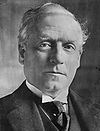Raymond Asquith
A distinguished Oxford scholar, he was a member of the fashionable group of intellectuals known as the Coterie, which included, Lady Diana Manners (with whom he had a long flirtatious relationship), Patrick Shaw-Stewart, Charles Lister, Hugo "Ego" Charteris, Julian Grenfell and Edward Horner.Asquith was junior counsel in the North Atlantic Fisheries Arbitration and the British Wreck Commissioner's inquiry into the sinking of the RMS Titanic, and was considered a putative Liberal candidate for Derby.The grave's headstone is inscribed: 'Small time but in that small most greatly lived this star of England',[8] a concluding line from Shakespeare's Henry V. In his 1928 obituary tribute to H.H.When I saw him at the Front he seemed to move through the cold, squalor and peril of the winter trenches as if he were above and immune from the common ills of the flesh, a being clad in polished armour, entirely undisturbed, presumably invulnerable.The War which found the measure of so many, never got to the bottom of him, and when the Grenadiers strode into the crash and thunder of the Somme, he went to his fate cool, poised, resolute, matter of fact, debonair.And well we know that his father, then bearing the supreme burden of the State, would proudly have marched at his side"[9]The writer John Buchan devoted several pages of his autobiography Memory Hold-the-Door to his friendship with Asquith."[10]Buchan's analysis of Asquith's personality is endorsed by several other contemporaries who found him clever but rather arrogant, cold, cynical and aloof.[O dawn of the east, brightness of light eternal, and sun of justice: come, and enlighten those who sit in darkness and in the shadow of death.]Omnium Animarum socii qui in foro et republica ad omnia ingenii virtutisque praemia spe et votis aequalium destinatus medio in flore aetatis armis pro patria sumptis fortiter pugnans occidit defunctum terra tenet longinqua et amica desiderio inexpleto prosequuntur suiN.[20] He was buried in France, but his memorial in St Andrew's Church, Mells was designed by his mother's friend Edwin Lutyens, who was a patron of Monsignor Ronald Knox.





Raymond Asquith, 3rd Earl of Oxford and AsquithHampsteadLondonGinchyKilled in actionWinchester CollegeBalliol College, OxfordKatharine Frances HornerJulian Asquith, 2nd Earl of Oxford and AsquithH. H. AsquithUnited KingdomBritish ArmyGrenadier GuardsFirst World WarBattle of the SommeBattle of Flers-CourcelettebarristerOxfordthe CoterieLady Diana MannersPatrick Shaw-StewartJulian GrenfellEdward HornerWinchesterBalliolfellowAll SoulsEldon Law Scholarshipcalled to the barEdwardiancounselBritish Wreck Commissioner's inquiry into the sinking of the RMS TitanicLiberalsecond lieutenantQueen's Westminster Riflesstaff officerbattalionCompanyGuillemontHenry VWinston ChurchillJohn BuchanMemory Hold-the-DoorSt Andrew's ChurchAmiens CathedralO ORIENSSomersetMells War MemorialSir Edwin LutyensPhoebe TraquairWilliam RothensteinUniversity of SouthamptonSir John Francis Fortescue HornerMells, SomersetLittle Jack HornerLady HornerWilliam GrahamPre-RaphaelitesJohn Singer Sargent4th Baron HyltonJulian Edward George Asquith, 2nd Earl of Oxford and AsquithTrimalchioEarl of Oxford and AsquithMells ManorEdwin LutyensMonsignor Ronald KnoxSiegfried SassoonEvelyn WaughThe TimesThe London GazetteFarrah-Hockley, AnthonyCommonwealth War Graves CommissionHistoric EnglandNational Heritage List for England2nd Earl of DurhamClarissa EdenWayback MachineLady Ottoline MorrellCoalition government 1915–1916January 1910December 1910Relugas CompactPeople's BudgetBattle of Downing StreetMarconi scandalThird Home Rule BillCurragh incidentBuckingham Palace ConferenceJuly CrisisBritish entry into World War IGallipoli campaignShell CrisisEaster RisingMaurice DebateLiberal PartyIndependent Liberal Party (1918)East FifePaisleyMargot AsquithHerbert AsquithArthur AsquithViolet Bonham CarterCyril AsquithElizabeth BibescoAnthony AsquithMaurice Bonham-CarterCynthia AsquithKatharine AsquithEdward Tennant, 1st Baron GlenconnerHarold TennantEdward the SeventhThe Life and Times of David Lloyd GeorgeNumber 10The Lost PrinceRector of the University of GlasgowRector of the University of Aberdeen1916 Prime Minister's Resignation Honours1920 Paisley by-election1925 University of Oxford Chancellor electionVenetia Stanley